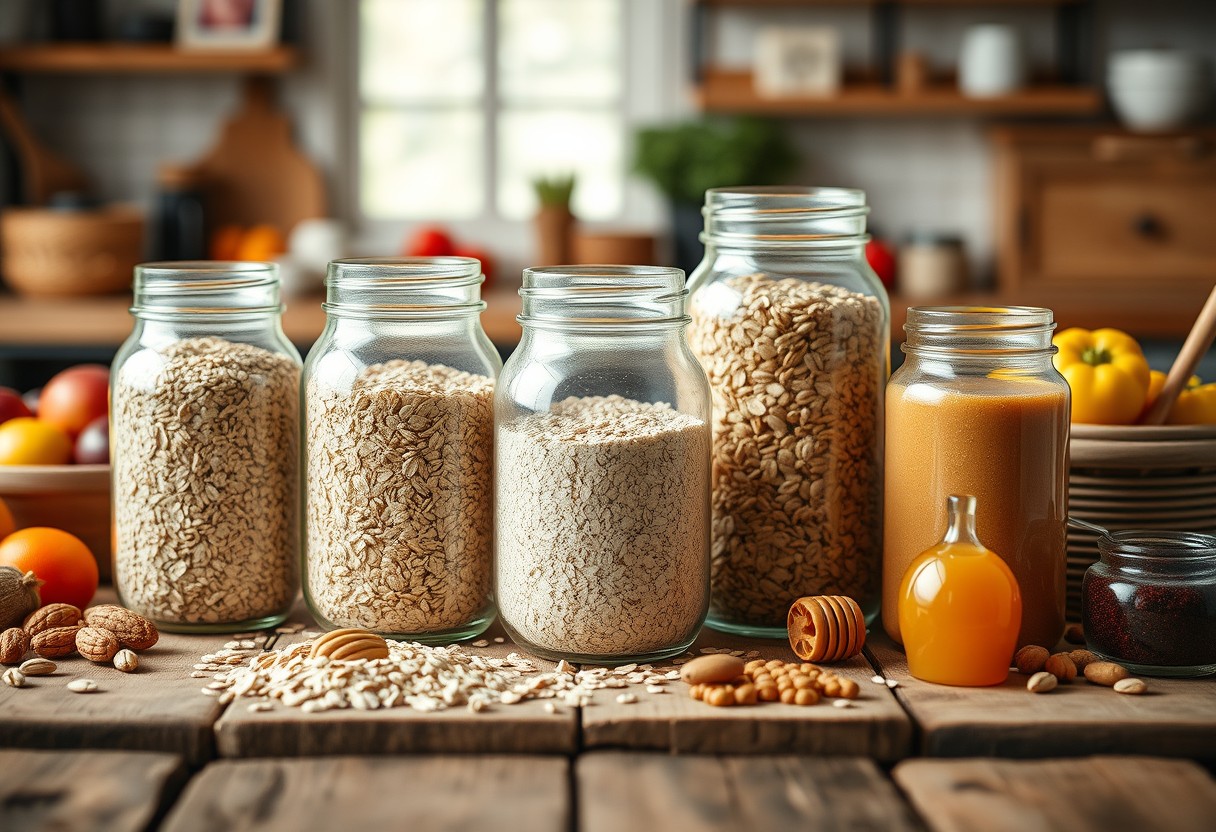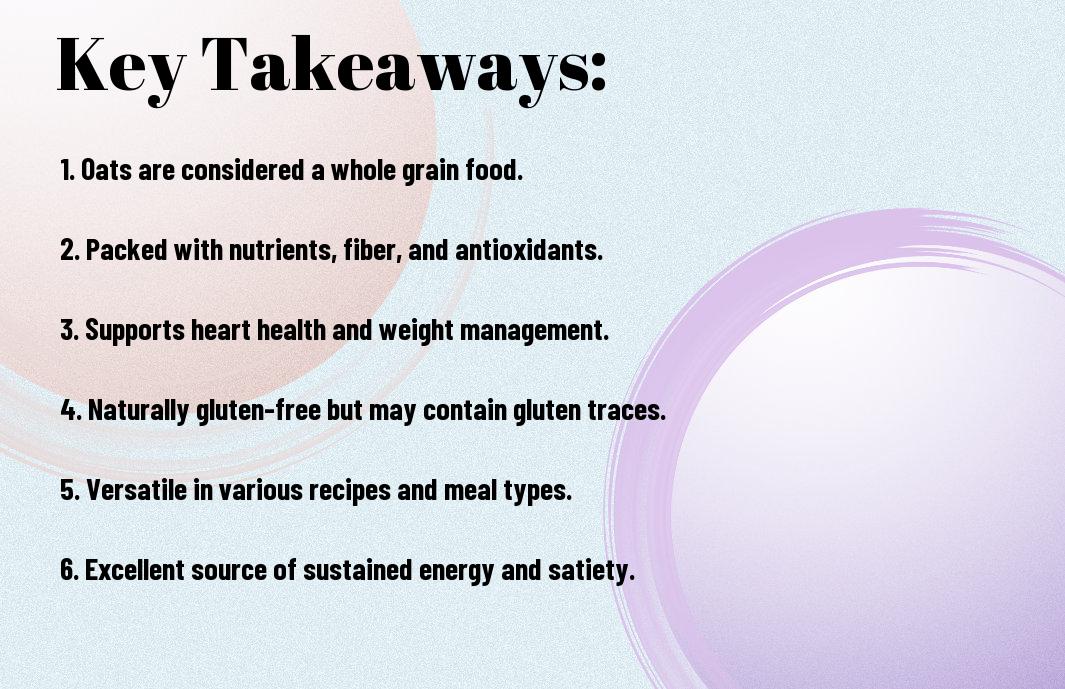Whole grains are imperative for a balanced diet, and oats are often a staple in many households. If you’re wondering whether oats qualify as a whole food, you’re not alone. Understanding the nutritional benefits of oats and their classification can help you make informed choices for your health. In this post, we’ll explore what defines whole foods and examine the characteristics of oats, so you can better integrate this nutritious grain into your meals.
Key Takeaways:
- Whole Food Classification: Oats are considered a whole food as they contain all parts of the grain, including the bran, germ, and endosperm.
- Nutrient Density: Oats are rich in necessary nutrients such as fiber, protein, vitamins, and minerals, contributing to their status as a whole food.
- Health Benefits: Consuming oats can support heart health, aid in digestion, and help regulate blood sugar levels, highlighting their wholesomeness.
- Minimal Processing: Rolled and steel-cut oats are minimally processed, making them closer to their natural state compared to instant oats.
- Variety of Uses: Oats can be incorporated into various meals, from breakfast to baking, making them a versatile choice in whole food diets.

Understanding Whole Foods
Before entering into the specifics of oats and their classification, it’s important to understand what whole foods are and why they play a crucial role in your diet.
Definition of Whole Foods
With whole foods, you are referring to foods that are minimally processed and free from artificial ingredients, preservatives, and additives. They are often in their natural state, retaining their imperative nutrients, fiber, and flavor, making them the foundation of a healthy diet.
Nutritional Benefits of Whole Foods
On focusing on whole foods, you benefit from a wide array of imperative nutrients, including vitamins, minerals, and antioxidants. These foods typically have a higher fiber content, which can support digestive health and promote satiety, helping you manage your weight more effectively.
Whole foods also contribute to reduced inflammation and lower risk of chronic diseases such as heart disease and diabetes. Including a variety of whole foods in your diet ensures that you receive a balanced intake of nutrients, thus positively impacting your overall health and well-being. By emphasizing whole foods, you invest in a lifestyle that supports energy, vitality, and longevity.
Oats: A Nutritional Overview
Some might wonder if oats are a whole food, but with their rich nutritional profile, they are certainly a staple in many healthy diets. Not only do they provide imperative nutrients, but they also offer various health benefits. For a great option, consider Organic Old Fashioned Whole Grain Rolled Oats, 32 oz, which are both wholesome and versatile.
Types of Oats
Any discussion about oats usually includes several types that cater to different preferences and cooking methods. Each type varies in texture, cooking time, and uses:
- Whole Oat Groats
- Steel-Cut Oats
- Rolled Oats
- Instant Oats
- Oat Flour
The distinction between these forms can influence your cooking experience and the dish’s final texture.
| Type of Oats | Cooking Time |
|---|---|
| Whole Oat Groats | 50-60 minutes |
| Steel-Cut Oats | 20-30 minutes |
| Rolled Oats | 5-10 minutes |
| Instant Oats | 1-2 minutes |
| Oat Flour | Not applicable |
Nutritional Composition of Oats
With their rich blend of macronutrients and micronutrients, oats pack a powerful punch. They are particularly known for being high in fiber, protein, and imperative vitamins and minerals.
To give you a clearer picture, oats contain significant amounts of soluble fiber, particularly beta-glucan, which can help manage cholesterol levels and improve heart health. In addition, they provide a range of vitamins including B vitamins and minerals like iron, magnesium, and zinc, all imperative for your body’s overall functioning and health. The combination of these nutrients makes oats a powerful whole food to include in your diet.
Oats as Part of a Whole Food Diet
For those seeking to adopt a whole food diet, oats present a versatile and nutritious option. Incorporating oats into your daily meals can significantly enhance your overall nutritional profile, providing you with imperative vitamins, minerals, and fiber. By choosing whole grain oats, you ensure that you’re consuming a minimally processed food that supports your health goals and complements a well-rounded diet.
Role of Oats in Balanced Nutrition
Oats serve as a fantastic source of complex carbohydrates, offering sustained energy while being low in sugar. This makes them an ideal addition to breakfasts or snacks, helping you maintain your energy levels throughout the day. Additionally, they are rich in fiber, which can aid digestion and promote satiety, thus supporting balanced nutrition in your diet.
Health Benefits of Oats
Whole oats are not just filling; they also come with numerous health benefits that can impact your well-being positively. They are known to lower cholesterol levels, stabilize blood sugar, and promote heart health, making them a valuable addition to your diet.
With their high content of beta-glucans, oats can help reduce LDL cholesterol and may lower the risk of heart disease. They also provide antioxidants that fight inflammation, contribute to digestive health through their soluble fiber, and can even assist with weight management by promoting feelings of fullness. By including oats in your meals, you’re investing in your long-term health while enjoying a delightful and versatile food.

Final Words
Now that you have explored the nature of oats, you can confidently conclude that they are indeed a whole food. Rich in nutrients and health benefits, incorporating oats into your diet can enhance your overall well-being. As you focus on whole food options, remember that oats, in their minimally processed form, provide imperative fiber, vitamins, and minerals that support a balanced lifestyle. Embrace oats as a wholesome addition to your meals and reap the rewards of this nutritious grain.
FAQ
Q: Are oats considered a whole food?
A: Yes, oats are considered a whole food. A whole food is one that is minimally processed and is close to its natural state. Oats, particularly whole grain oats, retain their bran, germ, and endosperm, making them a source of fiber, vitamins, and minerals. For the healthiest option, look for less processed forms like steel-cut or rolled oats, rather than instant oats, which often have added sugars or preservatives.
Q: What are the health benefits of consuming whole oats?
A: Whole oats are rich in nutrients and offer several health benefits. They are a great source of dietary fiber, particularly beta-glucan, which can help lower cholesterol levels and improve heart health. Oats also provide important vitamins and minerals, including magnesium, phosphorus, and B vitamins. Additionally, they have a low glycemic index, which helps to maintain stable blood sugar levels, making them a great choice for those managing diabetes or looking to control their weight.
Q: How can I incorporate whole oats into my diet?
A: There are many delicious ways to incorporate whole oats into your diet. You can start your day with oatmeal for breakfast, topped with fruits, nuts, or seeds. Oats can also be used in smoothies for added nutrition, as a base for homemade granola, or as a flour substitute in baking recipes like muffins and pancakes. Additionally, oats can be added to savory dishes like meatloaf or veggie burgers to enhance texture and nutritional value.


